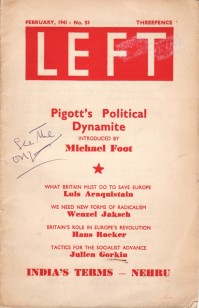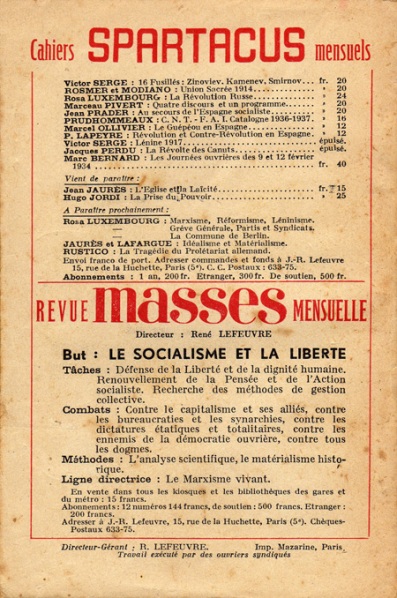Following Terry Glavin (linked here) and the Fat Man (linked here), Rosie Bell has a really good response to Julian Barnes’ recent NYRB George Orwell essay. Among other things, like the Fat Man she addresses his appeal to libertarians and conservatives of various sorts.
An example of the appropriation of Orwell by the right comes from this post at an American anti-Obama blog. The post is entitled “It was a bright cold day in April, and the clocks were striking thirteen.” This, of course, is the opening passage from Orwell’s amazing novel 1984. Compelling graphics show a Soviet American flag and Obama as Big Brother. Of course, it is a serious abuse of the concept of totalitarianism to think of Obama’s mild reforms as totalitarianism: there is no similarity between what Orwell observed the Soviet dictatorship doing and what Obama is doing.
Along with another quote from Orwell is this “quote” from Norman Thomas:
 “The American people will never knowingly adopt socialism. But, under the name of liberalism, they will adopt every fragment of the socialist program, until one day America will be a socialist nation, without knowing how it happened.”
“The American people will never knowingly adopt socialism. But, under the name of liberalism, they will adopt every fragment of the socialist program, until one day America will be a socialist nation, without knowing how it happened.”
Norman Thomas, Socialist leader, 1944
This Thomas quote is, I am fairly sure, a fabrication. If you google it, the hits all come from right-wing sites: over 54,000 hits. Malicious editors, usually anonymous, attempt to write it into Thomas’ wikipedia article, from which it is quoted by lazy bloggers as if everything in wikipedia is a fact (e.g. Standing on Truth, Moose Tracks, DaveGJ, and (slightly more intelligently) Kempite – to list those who have added to the myth this week alone).
A query at the talk page for Thomas’ wikipedia article has a response from Jim Miller, a university librarian, suggesting that the origin is a distortion of a comment made by Upton Sinclair to Norman Thomas:
We can build evidence for the possibility, or questionability, of this by looking at other people’s efforts to find it – for example, books.google.com search: liberalism socialism “norman thomas” gets 84 hits, including Lou Cannon. Governor Reagan: His Rise to Power. PublicAffairs, 2003. ISBN: 1586480308. (F866.4.R43 C36 2003 in most academic libraries; in 979.4… or BIO section of most public libraries). On page 125, Cannon says [of Reagan] …”a favorite line was this supposed prediction of Norman Thomas…”, and “This is a suspect quotation, and Reagan gave no reference for it”. Cannon also says in a note “If Thomas said this, I have been unable to find evidence of it….”
Naturally, a thorough researcher would try to find many other such books, from people of various political bents, to build a case that such a quote is either probable, possible, or unlikely. One would think such a striking quote would make it into biographies of Thomas; try the tables of contents and indexes for “Liberalism”, etc. Even statements from social and political historians (who claim to have looked for such a quote) can help build a case for or against it.
But it IS a good example of how even a false quote can take on a life of its own, because it shows how hard it is to prove a person did NOT say something – even if a “grand champion” history reference expert DOES end up finding this particular quote somewhere in unpublished Norman Thomas correspondence.”*
The right uses this fabricated “quote” to substantiate a double lie: that American liberalism is somehow socialism in disguise, and that socialism is by definition a form of totalitarianism or tyranny. The fact that Norman Thomas was a democratic socialist, who fought hard against all forms of totalitarianism or tyranny, not least the Soviet dictatorship, is utterly lost on them. The fact that American liberalism has, at most, called for mild forms of state regulation and never for any kind of socialisation of the economy is also, of course, lost on them.
*Footnote: Thanks to Bilber and Kathy for link to hoax-sniffers Snopes who are still “undecided” on the authenticity of this quote.








 From the archive of struggle
From the archive of struggle



![[Bitter Spring]](https://i0.wp.com/s.wsj.net/public/resources/images/ED-AJ640_book06_D_20090609163012.jpg)
 ay though?
ay though? “The American people will never knowingly adopt socialism. But, under the name of liberalism, they will adopt every fragment of the socialist program, until one day America will be a socialist nation, without knowing how it happened.”
“The American people will never knowingly adopt socialism. But, under the name of liberalism, they will adopt every fragment of the socialist program, until one day America will be a socialist nation, without knowing how it happened.”